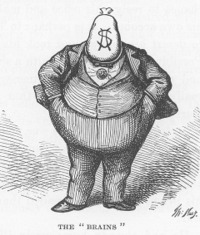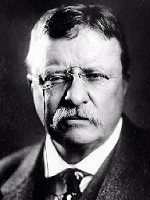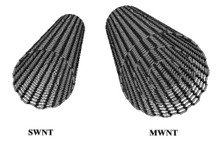Think of this as Volume 11, Number 21 of A-Clue.com, the online newsletter I’ve written since 1997. Enjoy.

All the economic problems of our time have a single root cause. (Cartoon by Thomas Nast, for Harper’s Weekly.)
Whether we’re talking about the Internet, about wireless technology, or about energy, the cause is a lack of reason to produce more.
Consider oil, only because it’s top of mind. Why should OPEC produce more? Why should any other major producer? Why should these suppliers lift a finger to halt the thefts and corruption which keep oil from the market?
Will they make more money by doing this? No, they won’t. Oil is at $130 per barrel and going higher. Add more supply and the price will go down.
The same is true for Internet service and wireless service. Why should the companies which control Internet broadband allow the creation of a "new pipe" in wireless? It would compete with their shared monopoly. Having kept prices for basic broadband at $50/month and higher, these monopolists are now moving to actually raise prices by limiting the number of bits they deliver under those contracts, and preventing the spread of competing technologies.
Why shouldn’t they? What is their incentive for investing in their networks to increase the number of bits they deliver? Will they earn more money as a result? No, they won’t.
The problem in all these cases is the same. Shared monopolies, or oligopolies. The free competition of capitalism naturally moves markets toward this climax state. Think Coke and Pepsi, or Bud and Miller, or WalMart and Target. A very small number of companies in each market control the bulk of supply, and are thus in a position to set prices. Why do you think it costs over $1 for a can of fizzy water?
While proclaiming the benefits of capitalism and competition, the United States government has been endorsing this principle of oligopoly for most of the last century, and that trend has accelerated during this decade. All that has really happened is that the oil producing nations of the world have figured this out and taken advantage.
So the answer to our economic doldrums is simple. We need to switch from giving people reasons to withhold product from the market and give them reasons to supply it.
The simplest, most natural way to do this is through anti-trust law. This will solve, at a stroke, all the problems that now exist in the Internet space, and in technology generally.
The phone and cable companies should not be allowed to control those pipes and call it "free enterprise." It’s not free enterprise. It’s not competitive. It’s monopoly. We have models on which to re-work these markets, not just the AT&T break-up but the earlier break-up of Hollywood between production and distribution, which kept those markets competitive for decades. (Not to mention the Standard Oil break-up.)
It’s natural to ask why these didn’t last. It’s because there wasn’t the political will to keep these splits alive. No grand principle was given to explain why this happened, or why it was necessary. The actions were seen as "government intrusion in the market," when in fact they were taken to protect the market, and allow it to thrive.
So let’s state this clearly. Monopoly is evil because it reduces the market’s efficiency, and creates incentives for producers to limit production. A vigorous anti-trust policy is in the best interest of the market.
The Clinton Administration, during the 1990s, tried to create such policies for the Internet. They were outmaneuvered and, eventually, overruled by the Bush Administration. We should re-institute those policies and go further. That is, the sale of Internet capacity and its distribution need to be divided, in both wired and wireless markets. Problem solved. If current wireless players don’t feel they can survive in such an environment, a new Administration can buy back their frequency licenses, at cost, and make those frequencies unlicensed, as WiFi is.
The problem is more acute in terms of energy, ironically because of something I’ve written here concerning the Internet for over a decade. It’s a worldwide market. It’s beyond the reach of U.S. law, especially anti-trust law.
The answer here, as I’ve said before, is the War Against Oil. That is, we must make it our highest priority, as a nation, as a people, as a market, to eliminate our dependence on hydrocarbons, first by replacing oil, then everything else.
The present incentives for hydrocarbon production which exist in our law need to be removed, every one of them. New incentives need to be created for the great tasks of the War Against Oil.
The War Against Oil provides a theme for necessary changes:
- Add intelligence to our electric utilities so they can buy as well as sell power.
- Increase the efficiency of high-power lines.
- Create a floor price so that new geothermal, wind, and solar supplies have a market.
- Create incentives for efficiency, and judge transport policies on their energy efficiency.
- Build a market for hydrogen, and infrastructure for managing that market.
This means we create incentives for high-speed train corridors, which can transport passengers with far more energy-efficiency in short hauls between cities. We support trains over trucks for transporting goods. We increase tax breaks for insulation in homes, offices, and factories, and create new incentives for going to more efficient motors and urban designs.
All these policies will create, in effect, new energy supplies. They reduce our carbon footprint as a by-product. Mainly they enhance our economy and our national security. By designating this a "war" against oil, we fight for economic change as we fought the Great Depression. We accept that there will be mistakes, accept that we’ll have to constantly adjust policies so they work toward the goal.
Combine broader Internet pipes with real incentives to remake the energy market and not only will our nation turn around, but so will the entire world. We can lead this new century if we have the will to change, to throw out the oligopolies which hamper our markets, and create new reasons to produce.
We need another Roosevelt, all right. Teddy Roosevelt.














The Clinton administration did what? I’m pretty sure the Republican controlled congress deserves any credit. Clinton was just as much a tool of the monopolists as Bush. However, Clinton’s administration didn’t go so far as to dismantle the apparatus of government, so there was only so much leeway for his pandering. On that score, he, and almost every other President in recent memory, was far superior to Bush.
I do agree that anti-trust is the most important tool in the government’s regulatory arsenal and one that has been used far too sparingly. Have these laissez-faire people learned nothing from watching the market “take care of itself” these past 3 decades? The best analogy I can think of is forest management. It is better to start the occasional controlled fire yourself, rather than waiting the devastating megafire that will eventually come, otherwise. Laissez-faire is as much a fantasy as communism. In the real world, extremism is never the right answer.
The Clinton administration did what? I’m pretty sure the Republican controlled congress deserves any credit. Clinton was just as much a tool of the monopolists as Bush. However, Clinton’s administration didn’t go so far as to dismantle the apparatus of government, so there was only so much leeway for his pandering. On that score, he, and almost every other President in recent memory, was far superior to Bush.
I do agree that anti-trust is the most important tool in the government’s regulatory arsenal and one that has been used far too sparingly. Have these laissez-faire people learned nothing from watching the market “take care of itself” these past 3 decades? The best analogy I can think of is forest management. It is better to start the occasional controlled fire yourself, rather than waiting the devastating megafire that will eventually come, otherwise. Laissez-faire is as much a fantasy as communism. In the real world, extremism is never the right answer.